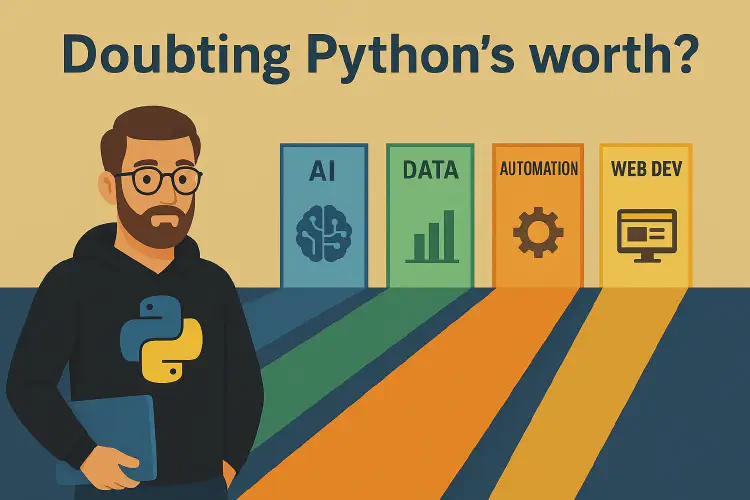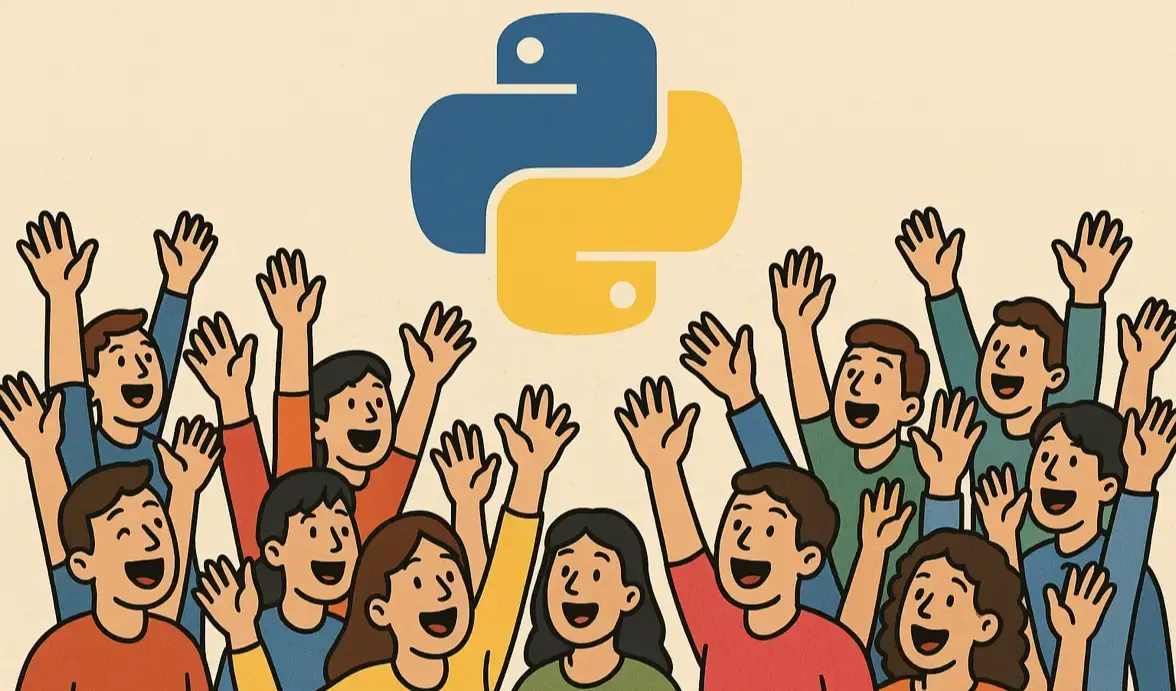Is Python Still Worth Learning in 2025?
Discover whether Python has gained or lost its impact, and if it’s still worth your time to learn.
- | 4 min read

Python has long been celebrated as one of the most beginner-friendly and versatile programming languages. But as we step deeper into 2025, some newcomers wonder: Has Python become “too popular” or even outdated?
With so many new languages and frameworks emerging, it’s fair to question whether it’s still worth investing your time in, or if it would be wiser to take the innovative route and explore one of the newer, less popular programming languages.
Before jumping to conclusions about whether Python is still worth learning, let’s take a closer look at what’s really happening, because what might make you doubt could actually be the reason why Python is more important and relevant than ever. Let’s dig in.
Python’s Popularity Is a Strength, Not a Weakness
Some may view Python’s widespread adoption as a disadvantage, assuming that since “everyone uses it,” the language is oversaturated or no longer innovative. But in reality, popularity signals maturity and stability. The same logic applies to spoken languages like English: its wide use makes it more valuable, not less. Think about it—would you rather be the one fluent in the language that connects people across industries, or the one who doesn’t speak it at all?
Python’s massive community has built a rich ecosystem of libraries, frameworks, and documentation. One of its biggest advantages is accessibility; whatever challenge you face, chances are someone has already solved it, and the solution is out there. This shared knowledge makes it easier to build, learn, and innovate. Unlike trend-driven languages that come and go, Python’s consistent use across industries ensures longevity for anyone investing time in learning it, offering both support and stability - all thanks to its popularity.
Python’s Power across Data Science, AI, and Automation
One of Python’s most compelling advantages in 2025 is its continued dominance across tech fields. For aspiring data scientists, AI engineers, or machine learning specialists, Python is often the language of choice for both prototyping and production. Its simplicity allows teams to focus on complex algorithms rather than wrestling with syntax. In 2025, as AI applications continue to expand, Python’s relevance is not diminishing; it is accelerating.
But its influence doesn’t stop there. In automation and DevOps, Python remains indispensable. Whether you are writing scripts to process files or manage cloud infrastructure, Python remains a go-to solution. Popular automation frameworks rely heavily on Python, highlighting its importance in modern DevOps workflows.

Python’s Ease of Learning and Readability
Another factor that makes Python an enduring choice in 2025 is its focus on readability and ease of learning. Python’s syntax is clean and intuitive, closely resembling natural language. This allows beginners to quickly grasp programming concepts while providing experienced developers with a language that supports rapid prototyping and collaboration.
In 2025, the need for accessible programming languages is greater than ever. Organizations are increasingly hiring individuals from diverse educational backgrounds, including non-traditional tech pathways, bootcamps, and self-taught programmers. Python serves as the perfect entry point, offering a gentle learning curve without compromising professional applicability.
The Future of Python
Python is not standing still. The language continues to evolve, with recent enhancements in type hinting, asynchronous programming, and performance optimization. Tools like PyScript bring Python to the browser, opening new avenues for web development. The strong community ensures that Python will remain relevant and adaptable to emerging trends, from AI and cloud computing to IoT and robotics.
Takeaways
Python is far from outdated. Its popularity is a testament to its reliability, versatility, and widespread adoption. For beginners, it provides a smooth learning curve and immediate applicability across multiple domains. For professionals, it offers powerful tools for AI, data analytics, web development, and automation. While no language is perfect for every task, Python’s combination of readability, ecosystem support, and industry relevance ensures that learning it is still a strategic choice for anyone building a modern tech career.
Whether your goal is to become a data scientist, automate workflows, develop AI models, or build web applications, Python remains a language that will continue to open doors and empower developers well beyond 2025.
Start Your Python Journey with Linero Tech
If you’re ready to start learning Python, Linero Tech offers a structured, flexible course designed to help you succeed:
- Flexible Scheduling: Study at your convenience. Our course is designed to effectively teach you the fundamentals of Python in 12 weeks, but you get 16 weeks access.
- Expert Guidance: Direct access to an experienced developer and teacher, Humberto Linero.
- Practical Experience: 197 coding challenges to make sure that you learn and develop coding “muscle memory”.
Ready to learn Python the right way, from day one?
👉 Discover our tech training programs
👉 See student reviews and success stories
